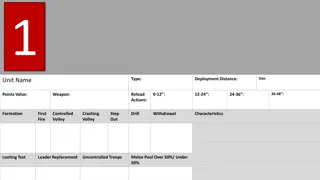Strategic Business Unit
A Strategic Business Unit (SBU) is and explore different types of SBUs including product, service, location, customer segment, and innovation-based SBUs. Understand the structure and importance of SBUs in large companies.
Download Presentation

Please find below an Image/Link to download the presentation.
The content on the website is provided AS IS for your information and personal use only. It may not be sold, licensed, or shared on other websites without obtaining consent from the author.If you encounter any issues during the download, it is possible that the publisher has removed the file from their server.
You are allowed to download the files provided on this website for personal or commercial use, subject to the condition that they are used lawfully. All files are the property of their respective owners.
The content on the website is provided AS IS for your information and personal use only. It may not be sold, licensed, or shared on other websites without obtaining consent from the author.
E N D
Presentation Transcript
What is a strategic business unit (SBU)? A strategic business unit (also known as SBU) is a business term used to present an independently managed entity or unit of a large company. Those strategic business units often have their own visions, missions, objectives, and course. Moreover, their planning is done separately from other businesses, and their goals are different from the parent enterprise and elemental to the long-term performance of the business. In other words, a strategic business unit is an array of a huge corporation that is responsible for its shared planning treatment. They can be business divisions, product lines of the division, or a particular product/service. No matter what SBUs are, they all target a specific group of customers or a geographical area. Despite working independently, the strategic business unit still has to report directly to the parent organization's head office when it comes to the status of their working process and performance. Normally, the strategic business unit looks at a specific market or industry.
Examples of a strategic business unit Being responsible for its own strategy and bottom line, a strategic business unit can be a division, a team, or a completely separate business. Also, they can be a marketing team that helps the whole company in operational functions. Now, we will show you some simple examples and different types of strategic business units. Products A large company can split up into small ones based on the product categories it provides. This type is the most common one when it comes to SBU. For example, a snowboard manufacturer decides to set up two strategic business units because it owns two product divisions, which are fashion and equipment. The fashion division and the equipment division have the same brand name and administrative functions, such as HR (Human resources) and information systems. Services Similar to products, companies also build up the strategic business unit according to their services. For instance, a telecom company can set up a data center division. This division will help the parent company in providing different services like a colocation data center.
Locations The location category or Region category is when a business targets customers from different nations or areas. A European fashion brand launches a Japanese distribution and promotion capabilities and takes it as a strategic business unit to help the company sell more products to Japanese consumers. Customer Segment When it comes to the customer segment, a business can have a separate division to service high net world individuals. One industry that is familiar with setting up SBUs based on the customer segment is Banking. Innovation The innovation category is used, especially when it comes to innovative products or devices. For example, a huge information technology business can be split up into strategic business units to launch its new innovative products. The unit is applied as a growth investment and avoids spending too much after launch.
The structure of a strategic business unit The structure of a company setting up SBUs consist of Operational units. Those units work as autonomous businesses. Within the SBUs structure, the highest corporate officials tend to assign the responsibilities of the company to the division owners in terms of regular operations and business unit strategy. Easily put, the parent officer has the responsibility of developing and executing the comprehensive strategy and managing the SBU via strategic and financial controls (also known as financial checks).
Characteristics of a strategic business unit In general, a strategic business unit has the following characteristics: 1.SBU is a separate business or a group of similar businesses that are in charge of scope for autonomous planning. 2.Strategic business units do not have the same set of rival companies as the others 3.The head of a strategic business unit will be responsible for the profitability, performance, and strategic planning of the specific unit. 4.SBUs work in different markets and target different groups of customers. 5.SBUs have different expertise in production or management that do not exist in the parent business.























